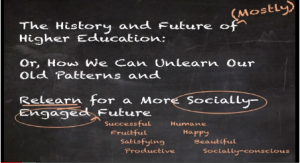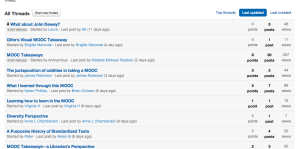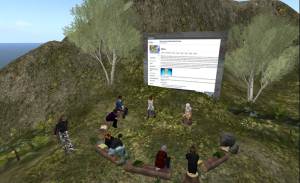Week #6 brings the end of the History and Future of Mostly Higher Education MOOC (#FutureEd). Time for reflection on what I’ve learned as well as the experience of the course itself (since that was part of the mission).
First, a few facts. This was a free, six-week course, offered on the Coursera platform, requiring 2-4 hours of work per week. Cathy Davidson, Duke University, was the instructor. The course was open to anyone interested in the topic to take asynchronously, but there also were three physical locations where the course took place synchronously. The axis of the course was a series of videos (4 – 6 of them per week) featuring Cathy Davidson, sharing her insights about education, interviewing other experts, and talking with other faculty. In addition to the videos, there were forums for discussion, quizzes, and small (optional) assignments. There was a “certificate” option for the course, which I did not take.
My participation in the course was fairly typical – I was there for the duration, but didn’t do the assignments. I kept up with the course’s pace, watched all of the videos, dipped into the forums, but I did not take any of the quizzes nor did I complete the assignments. I’m sure I would have gotten much more out of the course if I had but, even without that more robust involvement, I still got a lot and I’m very glad for the experience.
The most interesting content insights for me…
- The importance of knowing and using history purposively (what did we do in the past, and why)
- Unlearning (our preconceptions about how things “have to happen” and how difficult it is to shake old habits, be open to new ideas and new solutions)
- Value in alliances with other change makers (innovation is happening all around us – listen, learn and share)
- The importance of experimentation (the more novel approaches we try, the more likely we are to find ideas that work)
- There is value in what we count and we count what we value (interesting reflections on assessment)
As for the mechanics of the course, as with other MOOCs I’ve taken, it is a challenge to find community within the great expanse of an asynchronous MOOC. Although I visited the online forums each week, it felt like looking for a needle in a haystack (no pun intended…). There was just so much to wade through…and many of the comments and stories just weren’t relevant to me. Stephen Downes and George Siemens make good use of newsletters in their Connectivism MOOCs. They send out daily newsletters (via email) that serve as brief summaries, each with a curated list of things to read or watch. Downes and Siemens aggregate and sift, then share what they deem the most relevant and interesting blog posts, tweets, images, videos, and recordings made by the course participants.
It’s all about harvesting distributed information. To that end, Downes developed gRSShopper (see the “RSS” in the middle there?) to do this. It works to harvest links from given feeds (having established metadata tags in advance) and compile them. This solves the problem of the need for centralization (for sanity’s sake) in a learning environment that hopes to maintain and leverage a distributed network (!). People prefer to write in their own environments (not on a Moodle discussion board or a Coursera Forum), but something like gRSShopper pulls it all together to connect the learners. An idea that #FutureEd could have used. Stephen Downes says it well, “…connectivism is the thesis that knowledge is distributed across a network of connections, and therefore, that learning consists of the ability to construct and traverse those networks.”
One obvious path toward making such a BIG course feel more intimate and personal is to form a small group – a study or discussion group consisting of fellow travelers who share a common interest in the course. A number of small FutureEd groups formed during the run of the course – on Facebook, through Twitter, and a few who were geographically close met in person. Liz Dorland and I formed such a group and blogged about it here. We were a small, but intrepid, group who met weekly in the virtual world of Second Life for an hour to discuss and share. We probably could have done a better job of organizing the group, encouraging the members to come regularly, and perhaps we could have worked together to build artifacts of our learning – but it was a good start. Liz Dorland said it well when she said, “I’m sure we could do it better the next time we go through the course!” (one more time, Cathy?)
Our group would have benefitted from some guidance and support from FutureEd’s teaching hub. I wonder if, in future versions of the course, Cathy Davidson might recruit a small army of teaching assistant-type volunteers (I’m sure many would be happy to help). With a little advance preparation and training, these volunteers could fan out to provide mentoring for the myriad small groups organically forming in a course like this. As Dan Lynch, founder of Interop and former director of computing facilities at SRI International, wrote, “The most useful impact is the ability to connect people. From that, everything flows.”
Week #5, the most useful week in the course for me, provided an object lesson in getting the most from these online experiences. Innovation in Pedagogy and Assessment was the week-five overarching topic; we took a look at digital badging systems as an example of a novel way to think about assessment. Interestingly, one of the reasons that this turned out to be my most useful week was due to an unintended accident. Cathy had interviewed Connie Yowell, the Education Director for the MacArthur Foundation (and an expert on digital badging). Some disaster befell that interview video and, as a substitute, the course directed us to an alternate video (of Connie Yowell speaking at a conference) as well as other links and resources on the HASTAC site. Those directed explorations yielded a rich harvest for me. I watched, read, explored, reflected and then blogged about it. By far the most rewarding week and all because I invested more time – more of myself – to investigate, read and connect. Duh, right?
It was a terrific course – thoughtfully put together, well-organized, and welcome range of jumping off points to investigate and connect. Thank you, Cathy Davidson, and the whole team “behind the camera”.




My participation was much the same: all the lecture coursework but none of the assessments or assignments. Given the nature (mantra?) of the course to build new learning in new ways, I felt guilt if not instructional irony. But I did learn. New things and new perspectives. And, yes, moments I tried/did more I learned more.
Very nice explanation about moodle to moodle experts.